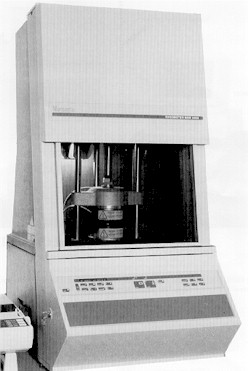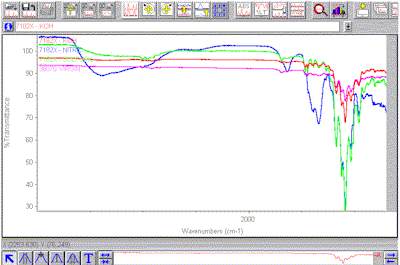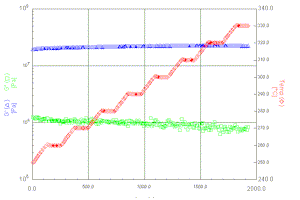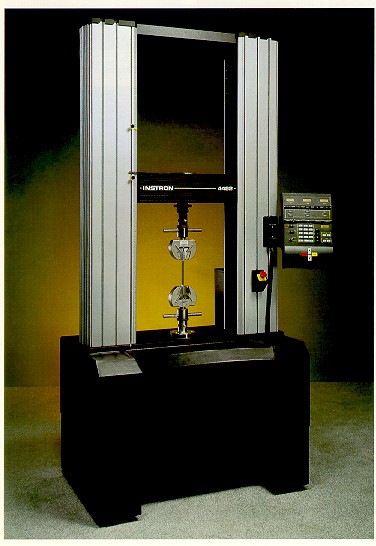Seals Eastern, Inc.
Rubber Analysis Capabilities
Tel: 732-747-9200
Seals Eastern's Material Development Center is equipped with state-of-the-art instruments for quantifying elastomeric material properties for research, development, QA, and forensic support. Our equipment includes:
 Used to characterize the cure profile for all Seals Eastern compounds. A sample of uncured rubber is
placed between the rheometer plates; the plates are then closed, forming a
sealed cavity. The plates are maintained at 330° F while one plate
oscillates. The stationary plate is equipped with a torque
transducer, which records the induced torque as time and curing progress.
Used to characterize the cure profile for all Seals Eastern compounds. A sample of uncured rubber is
placed between the rheometer plates; the plates are then closed, forming a
sealed cavity. The plates are maintained at 330° F while one plate
oscillates. The stationary plate is equipped with a torque
transducer, which records the induced torque as time and curing progress.
Seals Eastern utilizes Fourier transformed infrared spectral data for Quality Control and chemical analysis of
 rubber compounds and ingredients.
Seals Eastern employs a computer integrated FTIR instrument
to perform such analysis. We use the Nicolet® Model 460 bench combined with a Spectra-Tech Thunderdome ATR (Attenuated Total
Reflectance) accessory as an extremely powerful tool for analysis of
elastomer composition and chemical degradation. FTIR enables us to examine
the presence or changes of functional organic groups present within the
rubber composition.
rubber compounds and ingredients.
Seals Eastern employs a computer integrated FTIR instrument
to perform such analysis. We use the Nicolet® Model 460 bench combined with a Spectra-Tech Thunderdome ATR (Attenuated Total
Reflectance) accessory as an extremely powerful tool for analysis of
elastomer composition and chemical degradation. FTIR enables us to examine
the presence or changes of functional organic groups present within the
rubber composition.
Seals Eastern utilizes an ARES to characterize and analyze the
viscoelastic properties of its materials. The ARES Strain-Controlled Rheometer,
by Rheometric Scientific, is an advanced instrument capable of mechanical polymer characterization.
 The instrument is capable of a wide range of testing from steady shear to
multi-wave temperature sweeps. The instrument is capable of testing in the temperature range of -150° C to
600° C. Dynamic tests can be performed at frequencies between 10-5 rad/s
and 500 rad/s.
Flow and stress relaxation phenomena are easily observed using the ARES
instrument. To learn more about Dynamic Mechanical Thermal Analysis
read Luckenbachs paper (note:
you will need Acrobat Reader to down load this paper).
The instrument is capable of a wide range of testing from steady shear to
multi-wave temperature sweeps. The instrument is capable of testing in the temperature range of -150° C to
600° C. Dynamic tests can be performed at frequencies between 10-5 rad/s
and 500 rad/s.
Flow and stress relaxation phenomena are easily observed using the ARES
instrument. To learn more about Dynamic Mechanical Thermal Analysis
read Luckenbachs paper (note:
you will need Acrobat Reader to down load this paper).
 For standard (and some non-standard) measurements of rubber properties,
Seals Eastern, Inc. has two Instron tensile testing
machines. The Model 4400R and Model 1122 are equipped to perform tensile and
peel tests of virtually any rubber compound. Both machines are computer
integrated for precise data collection and generation of stress - strain
curves as well as integration of the area under the stress- strain curves. Standard tests include: ASTM
D429 Method B Peel Test, ASTM D1414 O-Ring Tests, ASTM D412 Tensile Tests.
For standard (and some non-standard) measurements of rubber properties,
Seals Eastern, Inc. has two Instron tensile testing
machines. The Model 4400R and Model 1122 are equipped to perform tensile and
peel tests of virtually any rubber compound. Both machines are computer
integrated for precise data collection and generation of stress - strain
curves as well as integration of the area under the stress- strain curves. Standard tests include: ASTM
D429 Method B Peel Test, ASTM D1414 O-Ring Tests, ASTM D412 Tensile Tests.
 Premium Quality Seals...
Premium Quality Seals...
For a Cleaner, Safer, More Reliable World.TM